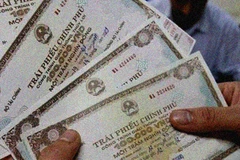In a study on the country's macro-economic performance in the firstquarter of 2013, the commission found that with domestic consumption andcredit demands remaining weak, this year's inflation is likely toremain under 7 percent.
This is further evidenced by averagestatistics for the past decade showing that inflation in the firstquarter often accounted for roughly 40 percent of the whole year's rate.
The commission observed that in the first quarter, bankliquidity generally remained stable and interest rates tended to fall intandem with inflation movements; yet the rate of deflation did notmatch up to businesses' expectations.
Slow credit growth in themanufacturing sector reflected weak capital absorption of the economy,the report noted. As of March 21, total lending increased only 0.03percent, while deposits rose 3.86 percent from the end of 2012.
Government bonds are still an attractive investment channel for banks with their attractive yields and apparently low risks.
However, with non-performing loans still posing major obstacles forenterprises to access bank capital, the credit growth target of 12percent this year is unlikely to be achieved.
According to the NFSC, the exchange rates remain stable due to the trade surplus and improved short-term investments.
The NFSC further recommended the government to give more support toenterprises in order to boost production and business by cuttinginterest rates, reducing corporate income tax to 20 percent as well asconsidering cuts to value added tax (VAT).
The commissionhighlighted the need to accelerate the process of dealing withnon-performing loans, explore the possibility of starting a debt assetmanagement company in the near future, and actively launching apreferential credit package to support the construction sector and thereal estate market.-VNA
























